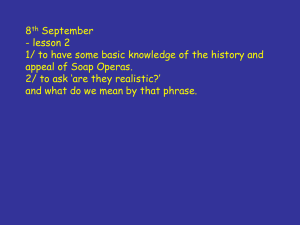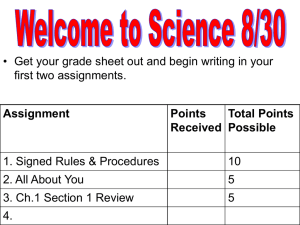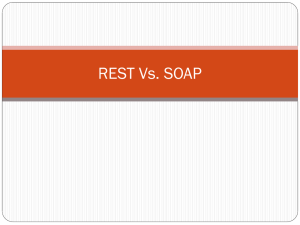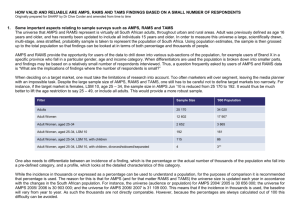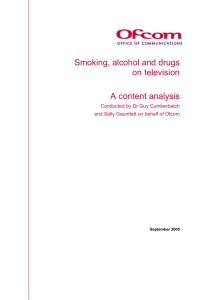Soap operas
advertisement
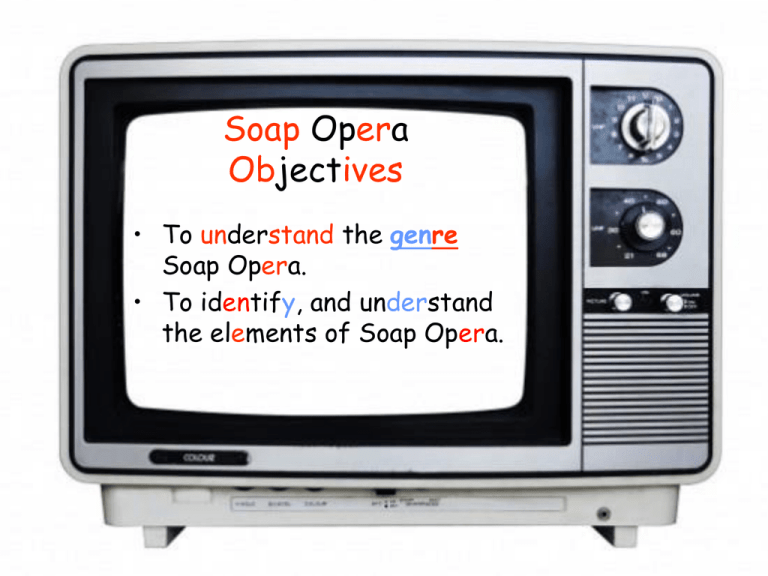
Soap Opera Objectives • To understand the genre Soap Opera. • To identify, and understand the elements of Soap Opera. • Soap Opera originated from soap manufacturers using the medium of drama serials through radio to sell their products. • In April 1941, the UK created the Soap Front line Family, which was broadcast through radio to America to encourage American intervention on Britain's behalf in World War 2. Elements • • • • Continuous open narrative Cliff-hanger Story spans many episodes Focus on current family life through personal relationships, topical issues, emotional and moral conflicts. • Settings are mainly places regularly used by characters. Name some examples of Soap Opera on TV. • • • • • Soap Opera Objectives Lesson 2. Objective: To understand and use current topics to create a Soap episode. To take part in organising and directing drama for a specific purpose and audience To encourage others to express their opinions and contribute own ideas To solve problems in the group by encouraging others Task- Improvise your own soap episode in household sized groups. • Focus on current family life through personal relationships, topical issues, emotional and moral conflicts. • Settings should be places regularly used by characters. • Where is it set? • Who are the characters? • What is the story going to be about? Soap Opera Objectives Lesson 3 • To understand and demonstrate the use of climax/anti-climax. • To understand and demonstrate the use of the cliff-hanger in the Soap Opera genre. • To apply a freeze frame appropriately. • Task- Using the improvised plays from the last lesson: • Create climax/anticlimax • End on a cliffhanger. Soap Opera Objectives Lesson 4 • To explore and understand how the deliberate use of levels , space and movement show character and story. • To explore and understand how the deliberate use of hot seating builds character and story. Lesson 5 • To use the voice to express character and emotion. • To explore and understand contrasts. • To know what is a dramatic pause and be able to apply it skilfully. • To write a script in the correct format. Tasks 1.Vocal contrasts A: (Angry and quiet) What are you doing? B: (Angry and loud) What are you doing? A: (In love and quiet) What are you doing? B: (In love and loud) What are you doing? A: (Upset) What are you doing? B: (Laughing) What are you doing? A: (Fast) What are you doing? B: (Slow) What are you doing? 2. The dramatic pause Script • Write dialogue and directions for your Soap. • All cast to have the same copies of the script. • Score scripts Soap Script Your script should include: • The place • The time of day • Non speaking actions important to the scene. • The character names with their (action/emotion) instructions and speech. Lesson 6 • • • • Objectives To take part in organising and directing drama for a specific purpose and audience. To create a complete Soap episode that uses dramatic pause and ends on a cliffhanger. To work in a variety of groupings to produce high-quality work To edit and annotate script. Lesson 7 • Perform • Communicate a radio production of a Soap Opera. • Communicate movement and action through sound. • Communicate character through voice. • Evaluate. During this course you can achieve the following levels: Creating--------------------------Level 7: • I can put all the research, discussion and ideas together • I understand and use the rehearsal process • I take part in organising and directing drama for a specific purpose and audience I understand and use abstract concepts. Level 8: • I can encourage others to express their opinions and contribute my own ideas • I can solve problems in the group by encouraging others • I am aware of, and suggest, different genres when devising work During this course you can achieve the following levels: Performing---------------------Level 6: • I can communicate a convincing character using words, movement and gesture • I can think of and apply different ideas to enhance a • performance • I can communicate the intentions of the playwright Level 7: • I take responsibility for my part and support other actors • I can take part in a full-length play • I can use a range of technical resources to enhance the play • I think carefully about the intentions of the playwright in terms of space, timing, and language Level 8 :• I can work in a variety of groupings to produce high-quality work Evaluating------------------- Level 5: • I can make constructive comments on my own and other people’s performances. Level 6: • I can respond to a range of texts in original and different ways • I can challenge ideas and contribute ideas sensitively • I can work in small groups to show how symbols can be used Level 7: • I can use technical terms to describe how characters and plots are shown in a drama • I can identify and analyse how different effects were achieved • I can comment on whether the effects used were relevant to the content of the drama Level 8: • I can use the appropriate terminology when reviewing performances • I can write about my own contribution to the work done in class • I can comment on dramatic effect

